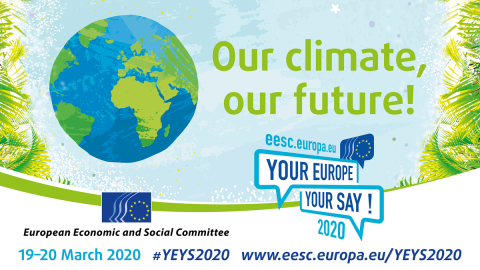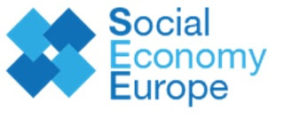

Young students from 33 countries all over Europe will travel to Brussels to discuss #ClimateChange & the future of our planet. It is the 11th edition of the #youth plenary event which will take place on 19-20th of March 2020! Climate change is on everyone’s mind, and young people all over the globe are mobilising to save the planet. The European Economic and Social Committee is joining the movement and asking the young participants at YEYS for the best way forward in protecting our planet. This year’s event will model an international climate change conference (COP).
The Committee is interested in hearing students’ fresh ideas on how to deal with the current climate crisis and how to come closer to meeting the 2050 climate-neutral ambitions. Students will be asked to represent a country and negotiate with each other, in order to come up with recommendations to stop climate change. These recommendations will be submitted to international environment policy-makers and discussed at conferences around Europe throughout the year. During YEYS, the students will also be put in contact with international youth organisations that will help them translate these recommendations into concrete measures and make their voice heard.
- Albania Turgut Ozal, Tirana
- Austria Bundesbildungsanstalt für Sozialpädagogik und Elementarpädagogik, St. Poelten
- Belgium Maritiem Instituut Mercator, Oostende
- Bulgaria St. Cyril and Methodius High School, Yakoruda
- Croatia High School Mate Balota Poreč, Poreč
- Cyprus Paralimni Lyceum, Paralimni
- Czech Republic Střední škola technických oborů, Havířov
- Denmark ZBC Gymnasiet Ringsted, Ringsted
- Estonia Koeru Keskkool, Koeru, Järvamaa
- Finland Iisalmen Lyseo, Iisalmi
- France Lycée Joseph Gaillard, Fort-de-France
- Germany Freiherr-vom-Stein-Gymnasium Lünen, Lünen
- Greece 2nd Gerakas Senior High School, Gerakas Pallinis
- Hungary Szent István Sport Általános Iskola és Gimnázium, Jászberény
- Ireland St. David’s CBS, Dublin
- Italy I.T.T. Enrico Fermi, Siracusa
- Latvia Jana Ivanova Rezekne music secondary school, Rezekne
- Lithuania Vilniaus Žemynos gymnasium, Vilnius
- Luxembourg Lycée Aline Mayrisch Luxembourg, Luxembourg
- Malta De La Salle Sixth Form Birgu
- Montenegro JUSMŠ «Ivan Goran Kovačić», Herceg – Novi
- Netherlands Haarlemmermeerlyceum, Hoofddorp
- North-Macedonia SOSU «Sv. Kiril i Metodij», Ohrid
- Poland I Liceum Ogólnokształcące im. M. Kopernika,Toruń
- Portugal Escola Secundária com 3º Ciclo de Fernão Mendes Pinto, Almada
- Romania National College «Ienachiță Văcărescu», Târgoviște
- Serbia Gimnazija «Svetozar Marković», Novi Sad
- Slovakia Obchodna akademia, Kukucinova 2, Trnava, Trnava
- Slovenia Gimnazija Nova Gorica, Nova Gorica
- Spain Ieso La Pola De Gordón, La Pola de Gordón
- Sweden Uddevalla Upper Secondary School, Uddevalla
- Turkey Pendik Fatih Anadolu lisesi, İstanbul
- United Kingdom Baysgarth School, Barton-upon-Humber
- EU European School EEBIII, Bruxelles



Recent Comments